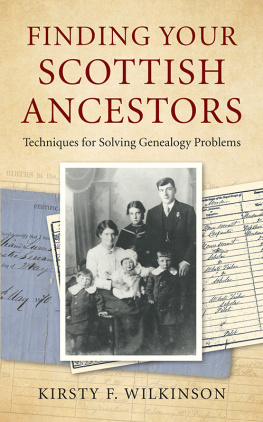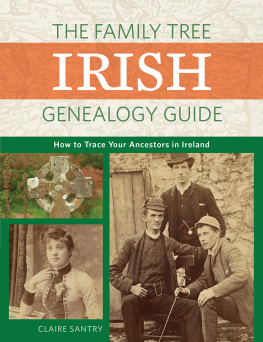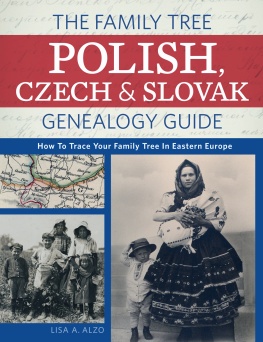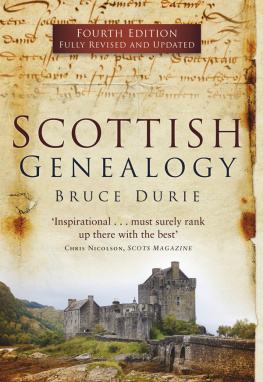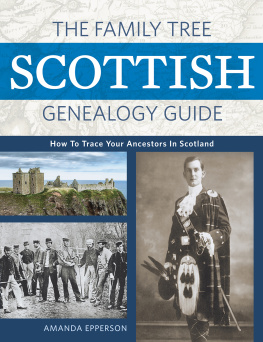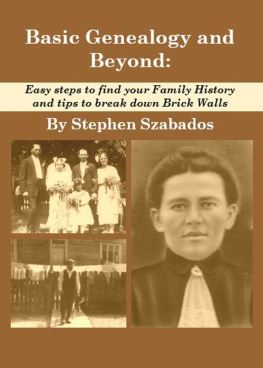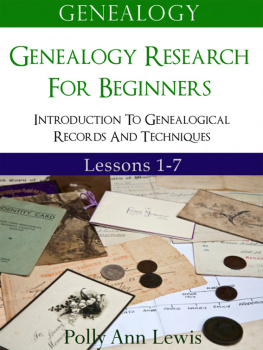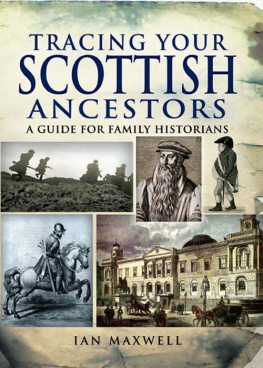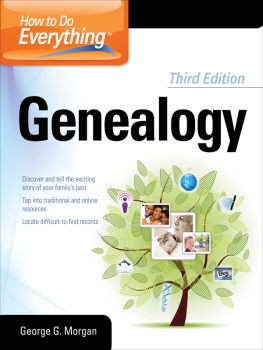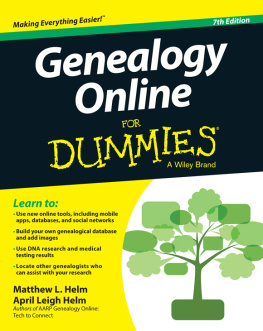FINDING YOUR
SCOTTISH
ANCESTORS
Techniques for Solving Genealogy Problems
In memory of my grandmother,
Mary Sneddon McNeil (19192001)
FINDING YOUR
SCOTTISH
ANCESTORS
Techniques for Solving Genealogy Problems
KIRSTY F. WILKINSON

First published in 2020 by
Robert Hale, an imprint of
The Crowood Press Ltd,
Ramsbury, Marlborough,
Wiltshire SN8 2HR
www.crowood.com
This e-book first published in 2020
Kirsty F. Wilkinson 2020
All rights reserved. This e-book is copyright material and must not be copied, reproduced, transferred, distributed, leased, licensed or publicly performed or used in any way except as specifically permitted in writing by the publishers, as allowed under the terms and conditions under which it was purchased or as strictly permitted by applicable copyright law. Any unauthorised distribution or use of this text may be a direct infringement of the authors and publishers rights, and those responsible may be liable in law accordingly.
British Library Cataloguing-in-Publication Data
A catalogue record for this book is available from the British Library.
ISBN 978 0 71983 054 9
The right of Kirsty F. Wilkinson to be identified as author of this work has been asserted by her in accordance with the Copyright, Designs and Patents Act 1988.
Acknowledgements
This book is the product of many years spent tracing Scottish ancestors and learning from the work of others. As such, it is not possible to acknowledge everyone who has contributed to it in some way, but my particular thanks go to the following: my clients, past and present, for entrusting me with their family history research and presenting me with many interesting problems to solve. My many friends in genealogy, online and in person, who have generously shared their knowledge and expertise over the years, and in particular Celia Heritage, who provided helpful feedback on an early draft. My publishers for their patience during what turned out to be a somewhat lengthier writing process than anticipated. My parents for gifting me the ancestors, who continue to inspire my family history research. And last but not least, my husband Phil for proof reading and for being an unwavering source of support.
Introduction
T his book is aimed primarily at those who have begun the journey of discovering their Scottish ancestors, but who find themselves facing problems that prevent them from progressing their research further, commonly known in family history circles as brick walls.
The term brick wall has become something of a clich in the world of genealogy. Pick up any family history magazine and you are likely to find an article or two promising to help you break through one. A brick wall is generally considered to be a problem that prevents a particular person or family line from being traced further. However, the term may also be used more broadly to describe any genealogy problem, such as when an individual cannot be found in records in which they are expected to appear (such as in a census taken during their lifetime), even if that doesnt prevent them from being traced further.
This book provides a range of information, advice and techniques to help solve these genealogy problems. The first three chapters describe the main records used to trace Scottish ancestors, and the repositories and websites where those records can be found. The next three chapters discuss good research techniques, and some of the approaches that genealogists worldwide have developed to ensure their research is thorough and accurate. looks at some of the reasons we may encounter difficulties when tracing our ancestors, and at solutions that may be applicable to many different situations. The final chapter deals with some specific genealogy problems and the sources available to tackle them, as well as looking at ways to take research further.
This arrangement reflects my own belief that many so-called brick walls are of our own making. Genealogy problems may be caused not only by a lack of knowledge of records and an inability to access them, but also by a failure to search effectively, approaching a problem with too narrow a perspective, and an unawareness of how to correctly interpret information found in records and to use that information to advance research.
It is no exaggeration to say that the availability of digitized records online, an area in which Scotland has been well ahead of her neighbours, has revolutionized genealogical research. When I first became interested in family history I would visit my local library after work on one of the evenings it was open late, hope to get a seat at one of the few microfilm readers, spend hours scrolling through census microfilms, and with luck, perhaps find one record of my family before closing time. Today I can access the same records, fully indexed, from home, at three in the morning whilst wearing my pyjamas (if I so choose!) and can quite literally find my ancestors at the click of a button. This has made tracing Scottish family history much easier, and has opened up genealogy to a far wider audience. But it has also created new problems, particularly in terms of searching online databases, and it has certainly not eliminated the need for good research technique.
When I decided I wanted to learn more about my Scottish ancestors, my first trip was to the library to borrow a book on tracing family history. I had little idea what I needed to know in order to get started, but found myself learning about what records were available, why they were created, where they could be found, and how to use them to trace my family tree. Before I began to scroll through those census microfilms, I had to consider where my ancestors were most likely to be living at that time. When I finally found them, I had a good understanding not only of the census records and their arrangement, but also of my ancestors community.
Todays beginner is most likely to start their research online and with a website that invites them to simply type in an ancestors name. That is not to say research guidance isnt available online there is plenty of useful information to be found on websites hosting genealogical records and elsewhere but it is often up to the individual to seek it out. It is surprisingly easy for the newly fledged family historian to trace several generations of their family, even quite accurately, with little understanding of the records they are using. It may only be when a problem is encountered that any outside guidance is sought.
I am certainly not advocating a return to the old way of tracing family history (if for no other reason than I rather enjoy researching in my pyjamas!), but I would argue that the need for good research practices is greater than ever if we are to get the most out of online records. And if we hope to solve the more challenging research problems, we need to look beyond the records available online to the many treasures to be found in Scotlands archives.
Good genealogical research technique means not only familiarizing ourselves with archival sources, but also changing how we approach a particular problem. Instead of thinking of which website or database we need to search, we should instead think about what records may exist that could solve our problem and how to access those records, whether that be online, in an archive, or by searching an online or published index prior to visiting a physical repository.

